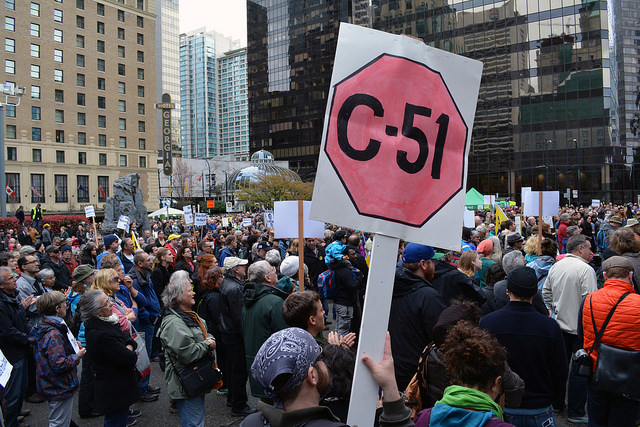UPDATE: Since this piece was published, U.S. President Donald Trump banned visas from seven Muslim-majority countries and has ratcheted up xenoophobic rhetoric and policies. As a result, a National Day of Action against Islamophobia and White Supremacy has been scheduled for Feb. 4 to oppose this shift. As a show of support, the day of action against surveillance legislation, organized by the CJFE has been moved to Feb. 25.
It’s been over a month since the public consultations on the status of national security in Canada have closed–and there has been mostly silence. Sometimes no news is good news. When it comes to the Deep State (the undemocratic underbelly of the government that includes CSIS, CSE, and RCMP), there is a chilled sense of anxiety. The Trudeau Administrations next move will define how the national security apparatus treats the already exploited members of our society. As well as the treatment of activists, academics, and journalists as they engage in labour critical to the established order.
The Anti-terrorism Act (2015), more popularly known as Bill C-51, was the focal point of this public consultation. The consultation, an experimentation in federal transparency around national security legislation, seemed to be no more than a delay tactic encouraging compliance while the “problematic” aspects of the legislation became more culturally embedded in Canada’s security and intelligence organizations.
Surveillance has become a ubiquitous feature of contemporary Western society. It is the ability to watch. Or to be visible. We are watched by our many devices: our browsing habits are recorded; our associations with peers and comrades are recorded; our intimate moments are recorded. The liberal sharing of data between the public and private sectors means that we lose control over the end destination of our data. And we have no idea what the consequences of all of this might be.
Because of the vast reach of digital technologies, a government can watch entire populations with the help of complex algorithms that collect, collate, and read big data. How governments actually do this is mostly opaque and veiled in secrecy.
Surveillance and visibility are everywhere. It is the new law of the land. We must be visible to each other and to those in power. And we’ve normalized it. No one reads the “Terms of use” or “Data/Privacy Policies” of any of the social media we consume because we know its contents are inevitable. We just tacitly accept that someone is watching all the time.
Surveillance has this nightmarish way of slowly creeping forward. As time rolls on in the history of the West, surveillance develops, widens its reach, and embeds itself slowly into our “common sense” perceptions of the world. It begins to seem natural. As if it was always meant to be there.
Surveillance waits out controversy. It waits out activists. It waits until things slow down and apathy peaks out before a new bill is introduced to chip away at more of our civil liberties.
One of the larger issues that we face is that surveillance seems to always take the status of an secondary issue in social and political movements. There is very little mass concerted action to oppose such invasive legislation. And only scattered groups of disparate but concerned citizens, activists, and journalists.
As Micheal Vonn, the Policy Director at the British Columbia Civil Liberties Association (BCCLA), warned, we can’t leave it to the government to decide. As she explained, “The public needs to know that in the national security realm your chances of revisiting something is very slim. The simple political logic is that if you take away any powers, however unjustified, however unhelpful, however ineffective, you will be a sitting duck for the next thing that happens when your political opponents point to you and say, ‘see, you caused that.'”
Few in government would willingly backtrack on the Anti-terrorism Act because they would be facing public fire the next time a controversy unfolds. This fear denies any logical or reasoned stance on civil liberties and accountability. Even if the legislation is ineffective (and according to Craig Forcese and Kent Roach, it is), people will fight tooth and nail to keep it in law.
This is an opportunity to move the issue of surveillance into its own social movement. It is high time that we organize, mobilize, and resist the progressive chipping away of the Charter of Rights and Freedoms and the progressive unveiling of the intimate features of our lives. If we step aside and let the Trudeau Administration solidify the Anti-terrorism Act we risk undermining every social movement. We risk empowering our government to freely disrupt and sabotage important movements around indigenous sovereignty, environmentalism, human rights, and anti-capitalism. We risk an era where resistance will become futile because they will see us well before we are able to organize.
On Febuary 4, rise up. If you aren’t in a place where there is physical mobilization—click here and pick one of the host organizations and drop a donation to help the cause.
The ideas mentioned in this blog post concerning surveillance as an auxiliary or secondary issue in social movements will be explicated in more detail in the forthcoming March issue of Briarpatch Magazine.
Image: flickr/jeremyboard
Like this article? Please chip in to keep stories like these coming.




